Anthony Albanese’s flawed Indigenous voice to parliament fails the test
The Australian tragedy of 2023 is about to unfold. Anthony Albanese has conflated the just cause of Indigenous recognition with a model that breaches too many principles to be supported.
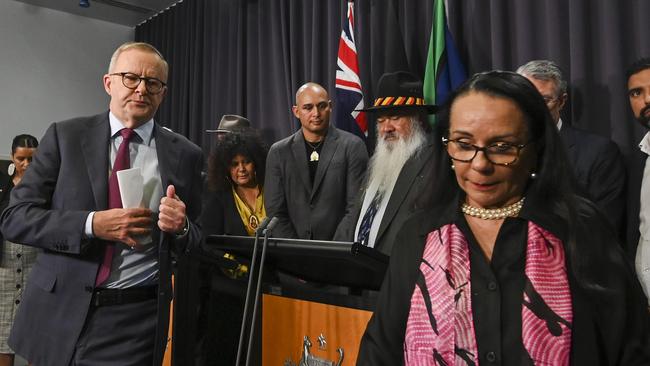
It is a tragedy because the Australian Constitution needs to recognise the Indigenous people and what they rightly call the “torment of our powerlessness”, yet the Albanese cabinet decision is an extraordinary and flawed model devoid of bipartisanship or any effort to achieve it.
This referendum is a profound risk for Australia. It has been a long process but with extremely limited consultation with the public – no constitutional convention, no parliamentary committee collaborating on the model, no meaningful effort to strike bipartisanship, incredibly not even the release of legal advice from the Solicitor-General and then, on Thursday, the Prime Minister doubling down in a rejection of efforts to modify or temper the model whose flaws have been documented.
In his announcement Albanese endorsed a maximalist voice, thereby guaranteeing a fundamental change in Australia’s system of parliamentary and executive governance and making a contentious referendum even more contentious. Instead of putting qualifications on the voice Albanese went the other way – bowing before the Indigenous working group, he refused any meaningful change to the voice’s capacity to advise the executive government or address reported concerns of the Solicitor-General and Attorney-General.
This is no way to finalise a referendum question. The optics are disastrous – Albanese left the impression of a compliant prime minister submitting to Indigenous demands. There is no reason to change the recent assessment offered to the Sydney Institute by human rights lawyer and voice supporter Frank Brennan: “What’s proposed is too fixed, too simple, it won’t fly and I don’t think the Australian public would ever accept it.”
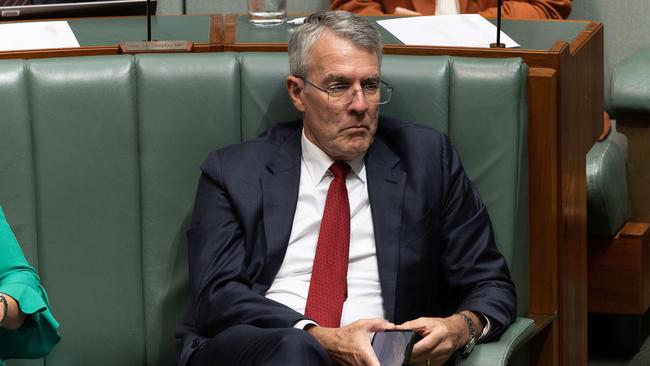
For Albanese, it is a personal mission. “I’m here to change the country,” he said. He wants to change the Constitution “to recognise the fullness of our history”. Magnificent vision. But beware prime ministers when they get emotional; it usually means a lurch into unreality.
Do cabinet ministers understand what they signed off on Thursday morning? This is constitutionally empowered group rights tied to constitutionally empowered unlimited representations. It is unprecedented in a dual sense. If carried, it will change our governance and society. There is no way the Coalition could support this model and retain its integrity. It is a sad conclusion from Albanese’s latest remarks that he seeks to carry this referendum on a tactic of deception – relying on goodwill, emotions and the injustice Indigenous people have faced for so long.
This is an intellectual and moral deception. And that needs to be said now because if this referendum is defeated its origins will lie with the decisions Albanese announced on Thursday and the defeat will be his responsibility as the prime decision-maker.
Don’t blame the Indigenous leaders. Having lacked political power for so long, when they saw a compliant prime minister they went for broke. The trouble is that Albanese has saddled himself with a model riddled with problems that guarantees a tactic of constant undermining by the No side.
The tragedy is that Albanese has conflated the just cause of Indigenous recognition with a model of the voice that breaches too many principles and runs too many risks to be supported.
The essence of this referendum is the insertion into the Constitution of a new institution with a vast constitutional ambit. It is a political institution designed to achieve a political purpose. There are numerous problems with the model but Labor essentially has chosen to ignore them and press ahead in a “crash through or crash” fatalism.
It is, frankly, incredible that since Albanese outlined his proposed referendum at the Garma Festival seven months ago there has been no public institutional process to examine and assess the proposal – just talk behind closed doors. This is an unacceptable foundation on which to ask the Australian people to endorse probably the most far-reaching referendum proposal since Federation.
This is an exceptionally rare referendum since it seeks to create a new chapter in the Australian Constitution. Albanese keeps up the pretence this is a “modest” proposal. That is false. There will be a new chapter nine in our Constitution that enshrines the voice. It will stand with earlier chapters dealing with the institutions of constitutional nationhood – parliament (chapter one), executive (chapter two), judiciary (chapter three) and so on.
It becomes a new advisory arm of government or what barrister Louise Clegg ventures to call “a fourth arm of government”.
The voice is an institution based on group or racial identity but empowered to make representations across the ambit of general laws and policymaking affecting the whole community since Indigenous people are part of the community. This is unprecedented in intent and scope.
We are told by Albanese this will unite the country. How does that work? If the Australian public understood what this institutional arrangement involved would they vote for it? That’s why Albanese’s campaign says the two issues are recognition and consultation. But that’s misleading.
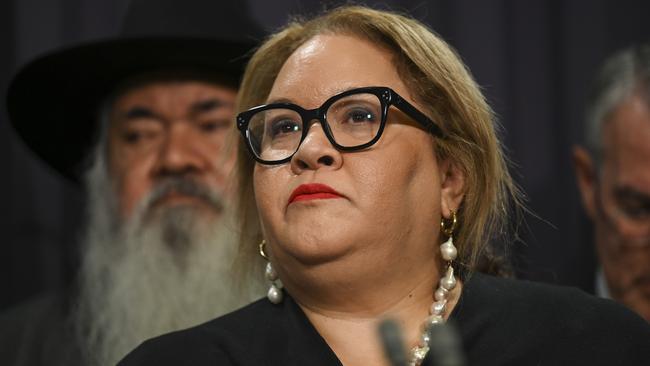
There are thousands, probably millions, of people who support recognition and consultation but who will oppose the voice because they believe it is divisive or dangerous. Law professor Megan Davis, a member of the working group, told ABC radio the Prime Minister had listened to the working group. She said the voice “will have an extraordinary impact in terms of the government of the day and the parliament”. It would be proactive; it wouldn’t wait to be consulted. It is “a very, very powerful mechanism”. We should believe her.
The referendum is about power. The voice will make representations not just to parliament but the executive government including cabinet, ministers and public servants as decision-makers. The idea the voice has limited influence because it is advisory is disingenuous. It will function as a powerful political entity exerting enormous influence. That’s the entire purpose. It’s what the whole idea is about.
The constitutional amendment is open-ended and unlimited, such that the voice can make representations on virtually anything – from the conditions of Indigenous people to tax, social, economic, resources, cultural, defence and foreign policy.
Trying to impose order on this open-ended constitutional power, Brennan urged the government to a surgical change – limiting or excluding its executive government advice in the Constitution, eliminating public servants from any constitutional ambit and letting the parliament take any such decisions.
He got nowhere. His effort trying to get a more viable, acceptable model was seen as counter-productive. Labor wants a voice with maximum interventionist scope, thereby inviting maximum resistance from the Coalition side of politics. This is smart politics? There is a fatalism at work here. Brennan argued that because the voice cannot possibly know about the multitude of decisions envisaged by hundreds of public servants affecting Indigenous people this would open the door to litigation, with the voice claiming it had been overlooked or muted.
What is the government’s response? Incredibly, it is enunciation of a new principle, outlined by Albanese, that the parliament and executive government should seek “written advice from the voice early in the development of proposed laws and policies”.
The voice doesn’t just make representations. It needs to be told beforehand – confirmation that the voice will be integrated into the system of government and parliament, adding another layer of review, advice and complexity. How far does this extend? Will public servants be required to give notice to the voice every time they are going to make a decision that might affect an Aboriginal person? Will all this await clarification from the High Court?
Albanese is committed to ensuring the voice can make representations to the executive government but has failed to deliver a constitutional amendment that makes this workable. Brennan warns that the impact on the public service will be “somewhat equivalent to – though bigger than – the major commonwealth administrative law reforms that occurred in Australia in the 1970s”.
The Prime Minister said people should support the referendum because we will “feel better” about ourselves. This is insulting and demeaning. It debases what this referendum is about and really says people don’t need to worry about what Albanese is proposing to do with our Constitution. The more he says this, the more he insults people. On every issue Albanese has deferred to the authority of the voice. This is surely an omen of the future – he has previously said it would be a brave government that ignored the advice of the voice. This underlines the sheer enormity of the political nature of this proposal.
How will the public respond? Clegg asked this question in her presentation to the recent Uphold and Recognise conference when she supported a far more modest model for the voice. Will ordinary Australians be impressed when voice members give doorstop TV interviews on parliamentary sitting days? Will they be impressed when there are public brawls over whether the voice has been properly consulted and listened to? Will they be impressed when there are deals done and horse-trading between voice members and federal parliamentarians?
How will advice from the voice stand with advice from the 11 Indigenous democratically elected members of the federal parliament? Who will have greater legitimacy and claim to be listened to?
How will the public service respond? Who in the executive government will get representations from the voice? The minister or the departmental head, or maybe a special unit created in every department and authority? What rules and processes will the public service follow after a representation from the voice arrives? Compliance in fear of retribution, or rejection with all the risks that involves?
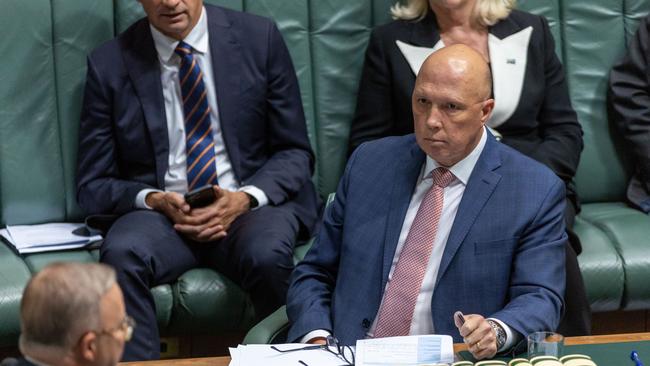
Albanese would have made his political calculations. He believes, obviously, the voice will be carried. He must also believe the referendum will damage Peter Dutton’s standing and leadership though such damage probably depends on the voice being carried when Dutton opposes it. Finally, Albanese must think Australia has reached a turning point – that generational change means its historic aversion to supporting referendums is broken and the voice will constitute a new pathway in our political and constitutional life.
These are big calculations with big risks. This looms as a remarkable moment for Australia given our elites – the professional classes, corporate leaders and progressive opinion-makers – seem united in supporting the referendum, with Labor assuming they will put money behind it. That means corporate leaders need to be held to account and explain why they support such a radical change to our governance, constitutional principles and society in a referendum where the government refuses to even release the Solicitor-General’s advice surrounding its proposal.
This referendum will become the most critical test for many years of the character and leadership quality of those elites.
The federal Opposition Leader and his legal affairs spokesman, Julian Leeser, have called for the release of the Solicitor-General’s advice. This is essential in terms of transparency. It may support the model or it may not – but we need to see it. Labor had no problem releasing the Solicitor-General’s advice to attack Scott Morrison over the multiple ministries – but no appearance of the Solicitor-General’s advice on putting a new chapter into the Australian Constitution. Not important enough? What does that tell you about the Albanese government?
The government says the best legal minds in the country have been involved in devising the words. That’s good. The reality, however, is that the best legal minds in the country cannot stop issues arising from the voice being referred to the High Court.
It is true the voice cannot dictate outcomes of the parliament and executive from its representations.
But granting the voice the power to make representations to public servants means the voice needs to know that a public servant has considered the representation in making a decision. Failing that, the voice can seek judicial review of a flawed decision.
Albanese says he feels the weight of history and responsibility. He says Indigenous people have waited long enough and cannot wait any longer, that it is time to recognise 65,000 years of history and that this decision is “a matter from the heart”. All this is true.
The work done by Indigenous leaders over years on this project has been immense. There are many reasons to support the referendum ranging from historic injustice to establishing a mechanism to allow Indigenous people to be consulted and to make representations on issues that concern them. There is no problem with these sentiments or these principles.
The problem is the model of the voice being proposed, its extraordinary constitutional powers and their implications. It is fatuous to say those constitutional powers, once granted, will not be used. The case against the referendum lies in its essence – the institutional power it seeks to create. That is where the decision must be weighed and made. Albanese carries the final responsibility for that model –and he has failed that test.


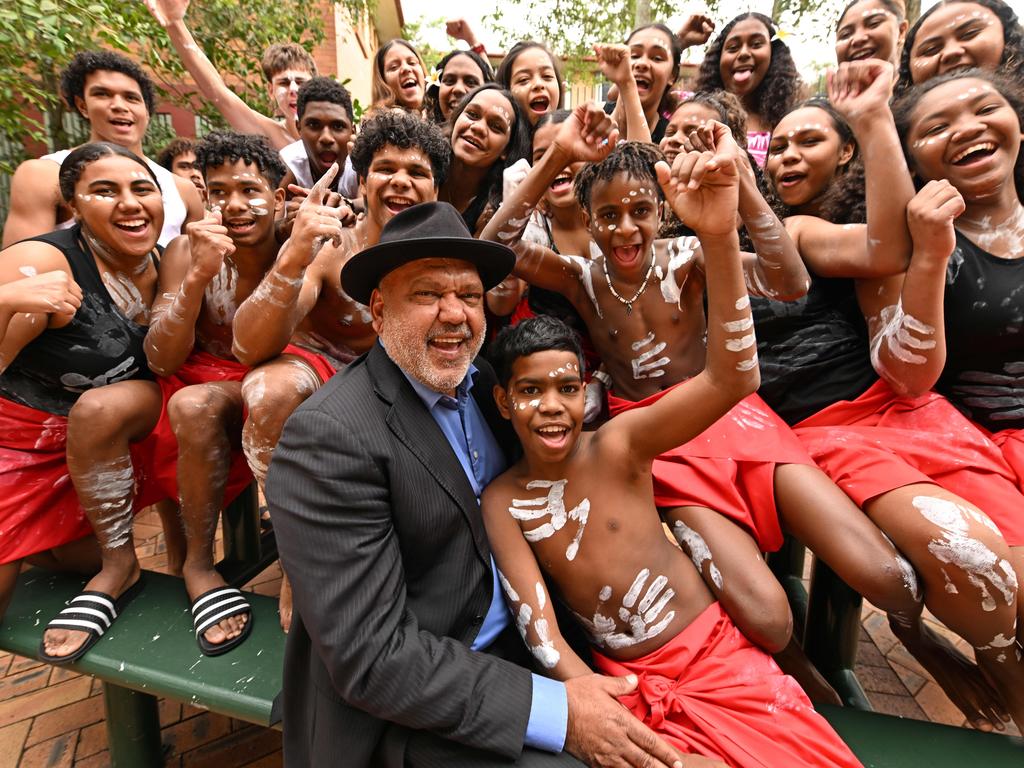
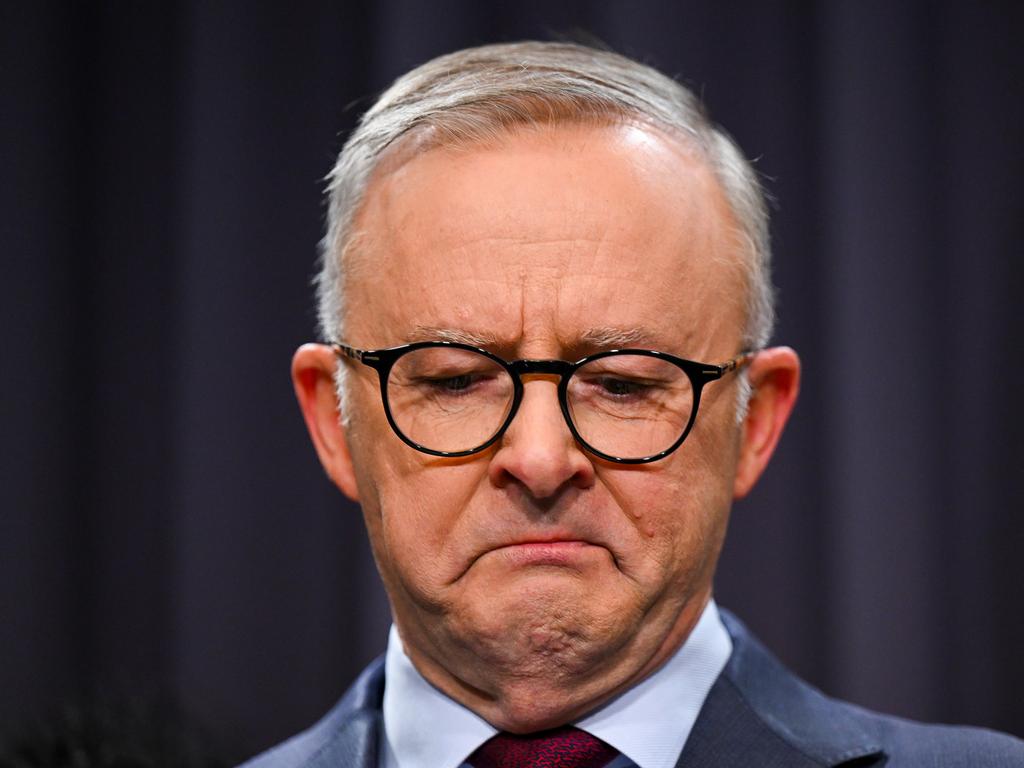
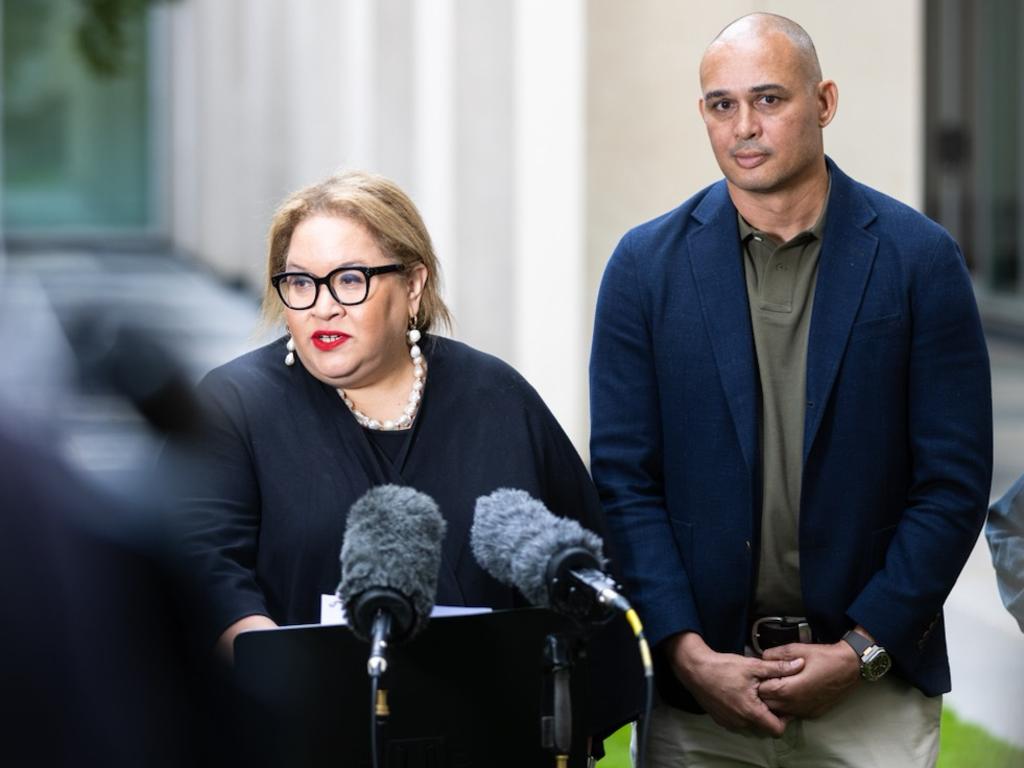
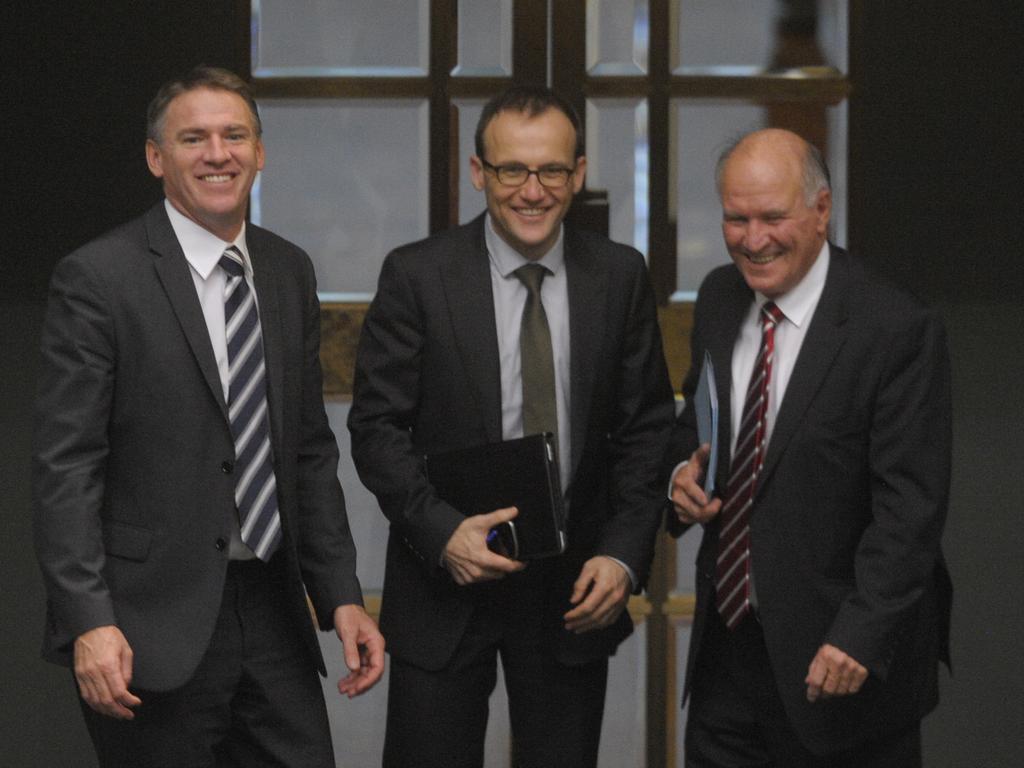
The Australian tragedy of 2023 is about to unfold. In the most important decision of his prime ministership and of his career, Anthony Albanese has finalised his proposed constitutional referendum for an Indigenous voice declaring his mission is to change this country.